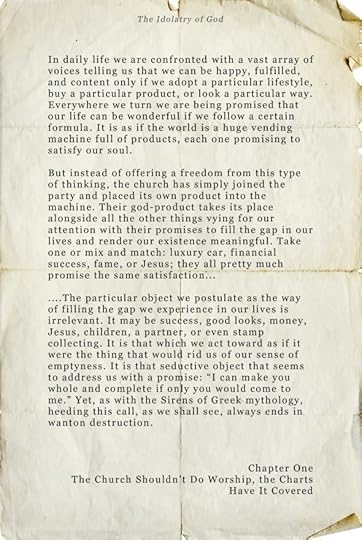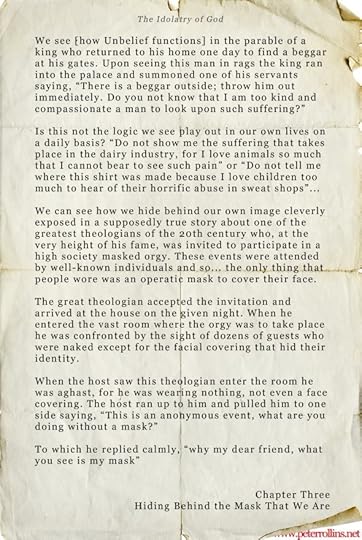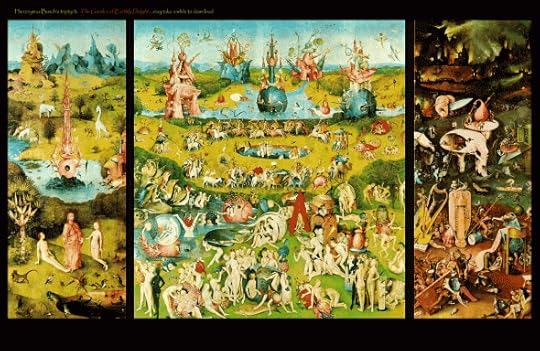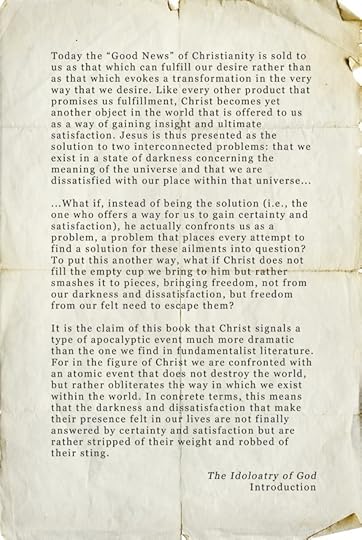Peter Rollins's Blog, page 38
December 5, 2012
Feminism and the Need to Treat all Adults as Moral Agents
Recently I was reading an online Feminist article that detailed a website which was promoting sexist, ridiculous and very idiotic views concerning how men ought to treat woman. The article explicitly made the point that the fact that there are men out there who still think in this way is morally contemptible and that work needs to be redoubled to educate these males.
One of the most disturbing things about the article they referred to however was not to be found in the body of the text, but in the comments section that followed it. For the article had lots of supportive comments, with many of them coming from woman. Some of the female commentators were congratulating the author for his “insights” and even adding to his ideas. Of course some of these could have been from men pretending to be woman so I did a web search to see how wide ranging female support of such ideas really were. This sadly confirmed my suspicions that the views that this man held were also echoed by many women across the world (particularly within religious communities). Views that wives should take leadership from their husbands, stay at home, dress in particular ways etc.
My concern with the article was the way that it held the man (and men more generally) as morally responsible for his views while not mentioning the obvious support of many women. My problem however was not that the article thus denigrated men but the very opposite. By mentioning only the man as morally responsible (remaining silent about the large number of female supporters), the article implicitly treated the man as a moral agent who was responsible for his views. More than this, the article spoke about men more generally, thus treating all men as morally responsible beings.
By doing this, the article remained within the traditional patriarchal frame because of the way that it saw men as free agents responsible for their actions while implicitly treating the woman as passive victims to be treated more like children. As we know the views of woman in the West (and beyond) have traditionally not been treated with the respect of being worthy of disagreement. Women were not treated as moral agents with legitimate positions to be engaged with. They were patronized as not really knowing what they were talking about or not being responsible for their thoughts. It was men who were taken seriously enough to be listened to, judged and condoned or condemned.
The problem then with attacking only men who hold sexist views (targeting male-focused magazines and not female focused ones etc.) is that we actually keep supporting a system that sees the man as the primary moral agent and woman as child-like victims of circumstance. In this way any attack that focuses only on sexism that arises from men betrays the wider cause of feminism.
The problem is not that there are still men who comport themselves toward woman in sexist ways, but that there are still people who do. If we believe that we are moral agents (and it would take a different post to argue why I do support a version of that idea) then we must take the bold act of holding all people accountable for what they say. This very act of attacking both men and woman is a key move in feminism, for it treats all adults as responsible and worthy of critique, thus undermining a very deeply embedded ideological support of patriarchy. If we do not do this then we continue to effectively support the patriarchal pattern of treating some people as less than the moral agents they would likely want to be treated as.
December 4, 2012
Faith as the proclamation, “It is Good”
Today the word “faith” is by and large used in order to express an individual’s belief in something for which they lack the body of evidence that would be required to make that belief intellectually justified. For example, one might say of a friend who has just been in a life-threatening accident, “I have faith that she will pull through.”
Yet there is something more than this at work here, for the belief is not simply one for which we lack enough evidence to make it a justified one; it is used in relation to a belief that we desire. For instance, if our friend who had the accident is so badly hurt that, should she survive, she would be in a coma for the rest of her life, we might say, “I fear that she will pull through.”
In this way the word “faith” isn’t simply connected to beliefs that lack a sufficient level of justification, but to a subsection of that group: those beliefs that we also desire.
Although this everyday usage has little to do with the original meaning of the word we can hear within it the distant echo of its origin.
For faith, in its full-blooded sense, describes a way of living in full confidence of something hopeful without actually perceiving that thing. The problem comes when this full confidence is seen as connected to some kind of intellectual affirmation.
To understand this we need to briefly consider why some of the earliest church writings were against the wisdom tradition (Worldly philosophy etc.). Why would this be the case? It is because the “wisdom tradition” describes a disparate body of thought that lays bare reality in its brute materiality; that is, beyond the imposition of subjective meaning. In the wisdom traditions things are just what they are and have no lasting value. It is against this that the Apostle Paul wrote.
However it is at this point that we need to be careful, for faith does not describe an intellectual disagreement with the wisdom tradition (which would put it on the same level, i.e. as a philosophical position). Faith describes a lived protest against it. In other words faith is a mode of life in which we encounter the world as infused with depth and meaning. It is an attitude towards the world that births within us a profound concern and care (as Heidegger wrote).
Think about this in relation to the work of love. If one believes that the world is meaningful, yet does not love, they cannot help but experience the world as meaningless. Yet if one believes that the world is meaningless yet loves, that person cannot help but experience their world as meaningful.
The confidence that comes from love has no necessary connection with ones rational reflection (if it did then only people with a particular philosophical outlook could love), it is a way of comporting oneself towards existence. To paraphrase Pascal, it is a reason of the heart that reason cannot know.
The lived certainty of faith then has nothing to do with belief or non-belief in gods, natural law or karmic returns. It is a mode of care that, when looking at the world, causes us to proclaim, “It is good, it is good.”
December 3, 2012
My face is My Mask
November 27, 2012
Beware the Siren Song of Meaning

The Idolatry of God comes out on 1st January (or, if you’re in the UK, it’s already released). You can get it from,
Amazon
Barnes and Noble
November 24, 2012
November 23, 2012
Happiness is Not a Three-Step Dance
Most people in the business of selling salvation, in both its sacred and secular forms, affirm a type of three-step dance that can be described in the following way,
Original Blessing
The Fall
Redemption
Lets take each of these in turn. Firstly, there is Original Blessing. Basically this is the claim that there was once a state of equilibrium, wholeness and fulfillment. The variety of ways that this can actually be articulated vary immensely. Depending on who one talks to this might be childhood, a past relationship, some golden era of history or a kind of pre-fall paradise.
Secondly, there is The Fall. This is the current state, a state in which there is some profound disruption in the harmony that once existed: an imbalance and internal conflict of some kind. This might be expressed in terms of a broken relationship, ill-health, a general melancholia or spiritual oppression.
Finally there is Redemption. Again there are sacred and secular forms of this stage, but it involves the articulation of a future time in which the balance, order and harmony that we feel we have lost will be restored.
In religious communities, new age spirituality and various forms of modern consumerism we see this three-step dance implicitly expressed and affirmed.
From a more dialectic position however this idea can be viewed as a fantasy generated by the nature of our self-consciousness. For reasons that go beyond the reach of this post (but which I describe in The Idolatry of God) there are not three separate steps, but rather there is one step, one reality, that can be perceived in three different ways. Before we get to that we can understand the dialetic order of the above differently,
The sense of a Fall
That causes us to imagine,
Original Blessing
Redemption
In other words, as self-conscious beings we inherently feel a sense of brokenness and lack-of-oneness-with-oneself. This internal antagonism causes us to imagine some pre-existing state in which this was not the case and then fantasise about a future state in which this will no longer be the case.
In this way there are not three seperate states that we pass through, but rather one state (that manifests itself in an infinite variety of ways). The point is not to be found in a crude form of materialism that would simply put its hands in the air and proclaim that life is suffering. But rather in the counter-intuitive psychoanalytic insight that the brokenness can be robbed of its sting through the very embrace of it. Salvation thus resides in transforming how we position ourselves in relation to this state. We can outline these various positions in this way,
We are broken and don’t acknowledge it (through repression, disavowal etc.)
We are broken and do realize it
We are broken and affirm it
This doesn’t mean that we simply accept difficult things in our lives and resign ourselves to them. Rather it means freeing ourselves from the idea that something will bring some final inner harmony and learning to work for small, incremental changes. In concrete terms this means that, if we are ill, we don’t wait for a sudden change, but take concrete medical action and attempt to face the illness. Or that we don’t hide away from the world in some compound (whether that is a real compound or our bedroom), imagining that it will be remade in a perfect way, but work up the courage to try and change how we live now.
The idea that there is some way of bringing wholeness and harmony into our lives is actually an ideology which acts against making real change here and now, thus rendering us more susceptible to those who promise that they have the diet, drug or divinity that would make everything perfect again.
The problem is that this path is easier to write about than walk. I know from my own life that embracing ones own inner sorrows is profoundly difficult. It might be the royal road to life before death, but it isn’t an easy one to tread.
November 20, 2012
Freedom From the Need to be Freed from Darkness and Dissatisfaction
In the run up to the publication of my new book The Idolatry of God I will be posting up quotes each week in the hope that it might whet your appetite…
Where Does Our Faith Lie?
This is a talk from at ikonNYC exploring the relationship between belief and unbelief as well as the nature of scapegoating as a means of avoiding inner conflict.
November 4, 2012
Becoming Human
Here is a talk I gave recently at Mars Hill on the subject of attempting to embrace our humanity.
If you’re always complaining then try being more negative
Sometimes people think that my work leads to a form of negativity in which we find ourselves lost in a sea of melancholia. The death of the idea that there is something that can render us whole and satisfied sounds, for some, like it sustains and supports a type of eternal complaint against life. But the point is the dialectic opposite: those who constantly complain about their lives are not too negative, rather they have failed to be negative enough.
To clarify, I am talking here of a type of negativity that is insatiable. The type of negativity found in those who are never able to enjoy their existence, regardless of what happens. Those who find it all but impossible to experience depth in their material circumstances (as opposed to legitimate protests against concrete injustice).
In these situations the problem is not that there is too much negativity, but rather that the individual has failed to fully enter into negativity. For behind the claims that ones life is unsatisfactory lies the notion that there is a life, just out of reach, that could offer that satisfaction.
By redoubling this failed negativity to the point where one is freed from the idea of a satisfaction-just-out-of-reach, one is able to enter into a type of material affirmation of the world that exists beyond the superficial nature of both optimism and pessimism.
The individual who is able to loose themselves from the notion that there is some ultimate purpose to their life frees themselves from the negative melancholy that comes with being unable to find that purpose (or the naïve optimism that comes from thinking that they will).
The secret, as John Caputo would say, is that there is no secret. Instead the challenge is to discover and deepen love. For love not only affirms the world, it produces a surplus in that joyful affirmation: acts that enact liberation.
Peter Rollins's Blog
- Peter Rollins's profile
- 314 followers









